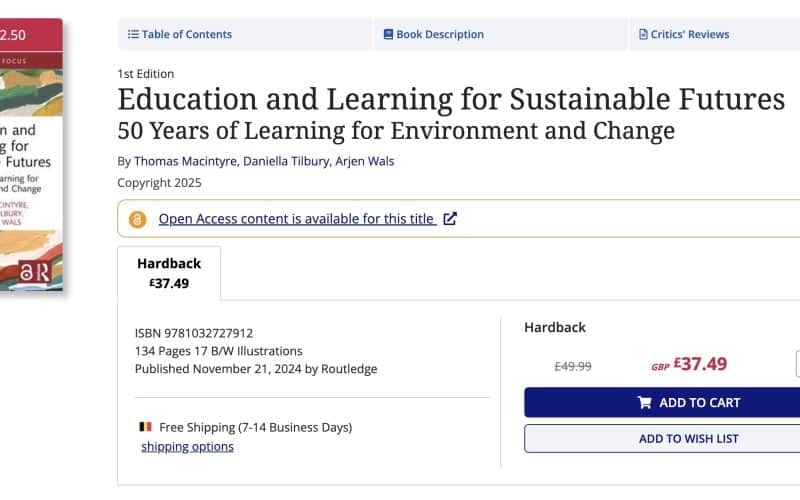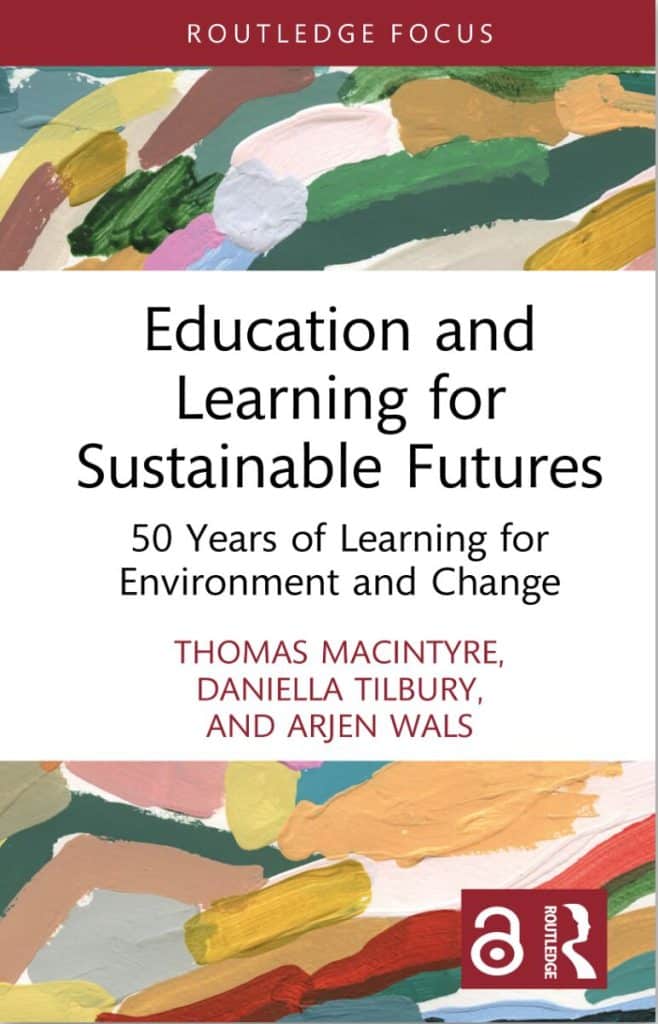
Out now is the book “Education and Learning for Sustainable Futures: 50 Years of Learning for Environment and Change” which offers a comprehensive analysis of the evolution of environmental education from the 1972 Stockholm Conference to the present. This open-access publication, funded by the Dutch Government, is available through Routledge and as an Open Access title.
Authors Thomas Macintyre, Daniella Tilbury, and Arjen Wals examine how educational narratives and practices have transformed over five decades, highlighting the increasing prominence of environmental learning in policy and practice.
Below we offer you an insight into what this book offers.
- 1 Historical Context and Evolution
- 2 Education’s Role in Sustainability
- 3 The Role of Artificial Intelligence
- 4 Future Challenges and Opportunities
- 5 Audience and Impact
- 6 Artificial Intelligence: A Double-Edged Sword
- 7 A Comprehensive Exploration of the Evolution of Environmental Education
- 8 About the Authors
Historical Context and Evolution
The book traces the development of environmental education across six distinct periods:
- 1970s: Inform and Experience
During this era, education focused on raising awareness about environmental issues, emphasizing experiential learning to foster a connection with nature. - 1980s: Investigate and Solve
The focus shifted towards problem-solving and scientific investigation, encouraging learners to identify and address environmental challenges. - 1990s: Rethink and Engage
This period emphasized critical thinking and active engagement, prompting learners to question existing paradigms and participate in environmental action. - 2000s: Connect and Change
Education aimed to connect various sustainability issues, promoting systemic thinking and advocating for change at multiple levels. - 2010s: Reframe and Transform Futures
The focus was on transformative learning, encouraging individuals to envision and work towards sustainable futures. - 2020s: Regenerate and Transition
The current decade emphasizes regeneration and transition, integrating innovative approaches to sustainability education.
Each chapter delves into these themes, analyzing the impact of historical events and shifting sustainability discourses within education.
Education’s Role in Sustainability
The authors explore also how education influences sustainability outcomes by:
- Raising awareness about environmental issues.
- Equipping learners with tools for critical thinking and problem-solving.
- Encouraging systemic approaches to addressing complex global challenges.
The book demonstrates how these educational practices have elevated environmental issues in policymaking and community action, emphasizing the increasing importance of sustainability education in global discourse.
The Role of Artificial Intelligence
A significant aspect of the book is the exploration of Artificial Intelligence (AI) as a potential bridge between digital and green agendas, offering opportunities for smarter environmental management and innovation toward sustainability. However, the authors also address concerns such as data privacy, the outsourcing of human decision-making to algorithms, growing inequalities, and the environmental impact of AI infrastructure.
Future Challenges and Opportunities
The final chapters consider the future of environmental education, emphasizing:
- The need for interdisciplinary approaches that combine education, science, and policy.
- The importance of fostering a culture of regeneration and collaboration to address global crises.
- Opportunities for innovation in sustainability education through digital tools and global partnerships.
The book proposes actionable strategies to reimagine education systems as transformative platforms for a sustainable future.
Audience and Impact
So what is the target audience for this book? Well, it seems to be quite diverse, including nut not limited to:
- Scholars and Researchers: Insights into historical trends and emerging opportunities in sustainability education.
- Educators and Practitioners: Practical examples and frameworks for integrating sustainability into curricula.
- Policymakers and Activists: Guidance on leveraging education to achieve sustainability goals.
The authors’ interdisciplinary expertise and collaboration with prominent global figures and organizations, such as UNEP and Stockholm+50, make this book a critical resource for anyone invested in environmental learning and action.
Artificial Intelligence: A Double-Edged Sword
A significant aspect of the book is the exploration of Artificial Intelligence (AI) as a potential bridge between digital and green agendas, offering opportunities for smarter environmental management and innovation toward sustainability. However, the authors also address concerns such as data privacy, the outsourcing of human decision-making to algorithms, growing inequalities, and the environmental impact of AI infrastructure.
A Comprehensive Exploration of the Evolution of Environmental Education
Critics have widely praised Education and Learning for Sustainable Futures: 50 Years of Learning for Environment and Change for its comprehensive exploration of the evolution of environmental education and its role in addressing global sustainability challenges.
Here’s a summary of the main points from expert reviews:
- Historical Depth: The book’s detailed analysis of five decades of environmental education is lauded for its thoroughness and clarity. Critics appreciate how the authors contextualize education within shifting global sustainability discourses.
- Forward-Looking Perspectives: The focus on Artificial Intelligence (AI) and its potential as a transformative tool for sustainability sets this book apart. While critics praise its optimism about AI’s role, they also commend the balanced discussion of risks, such as data privacy concerns and inequalities.
- Accessibility: Its open-access availability and structured, decade-by-decade analysis make it highly accessible to both scholars and practitioners.
- Scholarly Rigor: The book’s reliance on extensive research and inclusion of voices from experts like Tony Juniper, Marcia McKenzie, and Teresa Ribera add credibility and enrich its narrative.
Critical Acclaim from Experts
- Dr. Marcia McKenzie (University of Melbourne): Praises the book as “essential reading” for understanding the history and future potential of environmental education.
- Roel van Raaij (DuurzaamDoor Program): Applauds its focus on “learning as a strategy for a better future,” noting the blend of theory, practice, and lived experience.
- Dr. Lisa Siegel (AAEE): Highlights its dual role in acknowledging the legacies of environmental educators while preparing readers for future challenges.
- Dr. Tony Juniper CBE: Hails it as a “brilliant and timely summary” of achievements and future goals in sustainability education.
From our perspective we did notice quite some density of historical information, so it might feel overwhelming to readers without a strong background in environmental education. And while the book’s focus on AI is valuable, the technological aspects could have been explored in more depth, particularly practical applications for educators.

About the Authors
- Thomas Macintyre: Researcher specializing in transformative and participatory learning for sustainability.
- Daniella Tilbury: Honorary Fellow at St Catharine’s College, University of Cambridge; European Commission advisor on learning for the Green Transition; UK government’s focal point at the UN Economic Commission for Europe on education and environment.
- Arjen Wals: Professor of Transformative Learning for Socio-Ecological Sustainability at Wageningen University; holds the UNESCO Chair of Social Learning and Sustainable Development.
Despite a few elements that could have been approached differently, this comprehensive work offers valuable insights for scholars, researchers, policymakers, and practitioners engaged in sustainability education, environmental research, policy, and teacher education.
